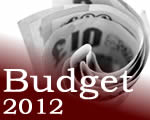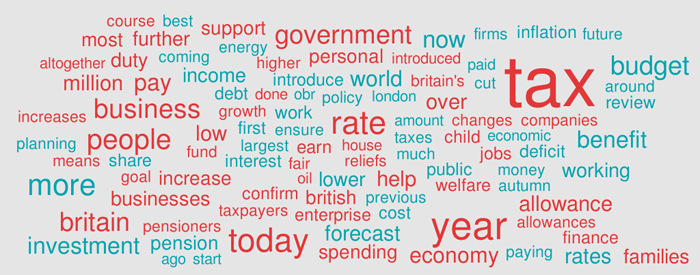 Go to main content
Go to main content
Archive Website of the UK government
Please note that this website has a UK government accesskeys system.
Main menu
Budget 2012 - 21 March
The Chancellor of the Exchequer, George Osborne, has delivered his third Budget, outlining how the government plans to raise and spend money during the coming year.
The detailed Budget documents

The full Budget Report contains the detailed text and figures behind the Budget announcements.
The documents are available on the HM Treasury website in a PDF format. You can download the entire report in one file or chapter-by-chapter.
Tax changes
The personal allowance will rise to £9,205 in April 2013
- The top rate of Income Tax will reduce from 50 per cent to 45 per cent in April 2013.
- The Income Tax personal allowance (the amount you can earn before you pay tax) will increase to £9,205 in April 2013.
- Age related allowances will be frozen from April 2013, moving towards a simpler, single personal allowance for everyone regardless of age.
- From 2014-15, taxpayers will receive a new Personal Tax Statement, telling them how much Income Tax and National Insurance they have paid and what their money is being spent on.
- Income Tax reliefs that aren't already capped will be capped at £50,000 or 25 per cent of income, whichever is higher.
- The main rate of Corporation Tax will reduce by an additional 1 per cent to 24 per cent from April 2012.
- Some VAT loopholes will be removed or simplified where the law is unclear. Under the proposed changes, VAT would be charged on all hot takeaway food (including from supermarkets), sports nutrition drinks, self-storage services and holiday caravans.
The new Income Tax rates for the 2012-13 tax year were published in December 2011 and will start on 6 April 2012.
Benefits
Child Benefit will begin to be withdrawn for households where someone has an income of over £50,000
- Child Benefit will be withdrawn when someone in a household has an income of more than £50,000. The benefit will be withdrawn gradually; 1 per cent of Child Benefit for every extra £100 earned over £50,000. Only those with an income of more than £60,000 will lose all their Child Benefit.
- Servicemen and women serving in operations overseas will receive 100 per cent relief on an average Council Tax bill.
The new rates for the State Pension and benefits for 2012-13 were published in December. These rates start in April 2012.
Alcohol and tobacco
- Duty rates for all alcoholic drinks will rise by 2 per cent above the rate of inflation. This will add 3 pence to the price of a pint of beer, 2 pence to a litre of cider, 11 pence to a bottle of wine, and 41 pence to a bottle of spirits. These will start from 26 March 2012.
- The government will shortly be publishing an Alcohol Strategy to address alcohol abuse.
- Duty on tobacco will rise by five per cent above inflation - a rise of 37p on a pack of cigarettes. This will come into force at 6.00 pm on 21 March 2012.
Motoring and travel
- Vehicle Excise Duty (car tax) will increase by inflation only.
- The government will take forward many of the recommendations from Alan Cook’s independent review of the road network, including developing a national roads strategy.
- The government will also consider new ownership and financing models for the national road network.
Housing
- A new Stamp Duty Land Tax rate of 7 per cent will be introduced for residential properties over £2 million from 22 March 2012.
- The Stamp Duty Land Tax charge applied to residential properties over £2 million bought into a corporate envelope will be increased to 15 per cent from 21 March 2012. There will be a consultation on the introduction of an annual charge on £2 million residential properties which are already contained in corporate envelopes.
- A New Buy Scheme was introduced last week to help those who cannot afford the larger deposits that some mortgage companies demand.
- The government will fund an extra £100 million of improvements in the accommodation of the armed forces and their families.
Pensions
- The government will reform the state pension system into a simpler, single tier State Pension for future pensioners. The new system will be introduced early in the next Parliament.
- Anyone reaching state pension age before the reforms are introduced will continue to receive their State Pension in line with current rules.
- The single tier will be set at a level above the basic level of the means test.
- The government has made it clear that it will recognise contributions that have been made to the current system under any reforms and will provide further detail in a White Paper in the spring.
- The government will commit to ensuring that the State Pension age is increased in future to take into account increases in life expectancy. Details of how this will work will be published this summer.
- There will be no changes to pension tax relief.
Employment
- The National Minimum Wage will increase by less than inflation, as recommended by the Low Pay Commission, to support employers and help protect jobs.
- Sunday trading laws will be relaxed during the Olympics and Paralympics.
Digital economy
- The government has committed to providing 90 per cent of the population with access to superfast broadband.
- There will be improved mobile phone coverage for rural areas and along key roads.
- Belfast, Birmingham, Bradford, Bristol, Cardiff, Edinburgh, Leeds, London, Manchester and Newcastle are to become broadband super-connected cities, as part of the £100 million investment announced at the 2011 Autumn Statement.
- £50 million will be used to fund a second wave of smaller cities.
The economy
The UK economy is predicted to grow by 0.8 per cent this year, and by 2 per cent in 2013
- Forecasts for UK growth and inflation from the independent Office for Budget Responsibility (OBR) are broadly unchanged from its forecasts from last November.
- The growth forecast for the UK this year is 0.8 per cent; it forecasts a growth of 2 per cent in 2013, 2.7 per cent in 2014 and 3 per cent in 2015-16.
- Inflation is expected to fall from 2.8 per cent this year to 1.9 per cent next year, and then rise to 2 per cent by 2016.
- The OBR’s forecast for the unemployment rate is unchanged from last autumn - the rate is expected to peak this year at 8.7 per cent and fall to 6.3 per cent by 2016.
- Borrowing - public sector net borrowing (PSNB) is expected to total £126 billion this year, falling to £120 billion next year. It is then forecast to fall to £98 billion in 2013-14, reaching £21 billion by 2016-17.
2011 Budget

Find out about the March 2011 Budget where the Chancellor announced changes to taxes and benefits, as well as spending plans for the public sector.
Pension and benefit rates

Details of pensions and benefits rates have been announced. The new rates will be paid from April.
Background to the Budget

Information on what the Chancellor’s speech covers and what happens on the day. Also, find out fascinating facts about the history and traditions of the day.
New Income Tax rates

Income Tax allowances and bands for the 2012-13 tax year have been published. These will come into effect from Friday 6 April 2012.
Related to this page
Latest updates
- HM Treasury on Twitter
- Budget 2012 on HM Treasury
- Budget 2012 on HMRC
- Budget 2012 on Business Link








